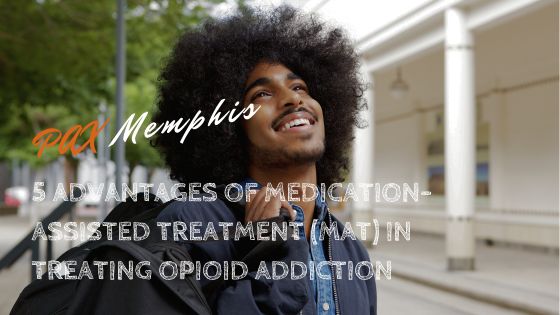Opioid addiction continues to wreak havoc on the United States, with 75% of drug overdose deaths in 2021 involving an opioid.[1] Since opioid abuse is causing unprecedented harm to communities across the country, addiction experts have begun using more aggressive approaches to recovery.
Instead of allowing people to suffer through withdrawal symptoms and cravings that often lead to relapse, opioid rehab centers often use a method known as medication-assisted treatment (MAT). This technique involves the use of FDA-approved medications to limit withdrawal symptoms and cravings in combination with traditional addiction treatment methods like evidence-based therapies and counseling.
There are several benefits of medication-assisted treatment (MAT), including a reduced risk for relapse. If you or a loved one are suffering from opioid addiction and would like to discuss your treatment options, please contact our team at PAX Memphis Recovery today.
What are the 5 Benefits of Medication-Assisted Treatment (MAT) for Opioid Addiction?
Medication-assisted treatment for opioid addiction comes with many advantages, especially not having to deal with uncomfortable and sometimes painful withdrawal symptoms. With that being said, the South Dakota Departments of Health and Social Services reports that using MAT medications reduces the death rate of people with opioid addiction by 50%.[2]
Five benefits of medication-assisted treatment (MAT) include:
1. Reduced Symptoms of Opioid Withdrawal
Medication-assisted treatment plays a huge role in the process of opioid detox. Because opioid withdrawal symptoms can be extremely difficult to cope with, MAT programs provide FDA-approved medications that are clinically proven to lessen the side effects people experience.
Medications like methadone and suboxone attach themselves to opioid receptors in the brain, preventing you from experiencing significant withdrawal symptoms and making early recovery much easier to cope with.
2. Lessened Cravings for Opioids During Early Recovery
Many people continue to take MAT medications even after their withdrawal symptoms subside because they can lessen the cravings that people often experience while they are still adjusting to sobriety psychologically.
By taking these medications, you can prevent severe cravings, making you less likely to suffer from an unnecessary relapse. This translates to helping you achieve long-lasting sobriety.
3. Reduced Risk of Relapse and the Following Consequences
When someone relapses on opioids, they are at risk of an array of behavioral and health consequences. For example, if you are an IV drug user, relapsing puts you in danger of contracting diseases like HIV or hepatitis. Additionally, you might engage in criminal behavior and get arrested. However, since MAT programs reduce the risk of relapse, they also lessen the likelihood of criminal behavior and contracting dangerous diseases.
According to the Substance Abuse and Mental Health Services Administration (SAMHSA), “Research also shows that these medications and therapies can contribute to lowering a person’s risk of contracting HIV or hepatitis C by reducing the potential for relapse.”[3]
4. High Rates of Success
When you aren’t having to deal with opioid withdrawal symptoms or cravings, you are more likely to stay sober and be able to gain the tools you need to maintain long-term sobriety. This translates to medication-assisted treatment providing higher rates of success than other forms of opioid addiction treatment.
For example, about 90% of patients who participate in medication-assisted treatment remain sober at the 2-year mark.[2] Not only does this prove initial effectiveness, but it shows that MAT helps people maintain long-term sobriety from opioids.
5. The Ability to Focus More on Your Recovery
Opioid addiction often stems from underlying issues like childhood trauma and untreated mental health conditions. When you are dealing with withdrawal symptoms and cravings, it can be hard to focus on the therapy you need to unpack the root causes of your addiction.
However, medication-assisted treatment makes it easier for you to fully immerse yourself in your treatment program, making therapy more effective at the same time. This means that instead of simply treating the symptoms of addiction, you are addressing the causes and improving your chances of long-term success.
Find a Medication-Assisted Treatment (MAT) Program Near You
If you or a loved one suffers from opioid addiction, medication-assisted treatment might be right for you. These programs utilize traditional addiction treatment methods like behavioral therapy and counseling while offering medications that ease the physical symptoms of addiction.
To learn more about MAT programs for opioid use disorder and how to get started, contact PAX Memphis today.
References:
- The Centers for Disease Control and Prevention (CDC): The Drug Overdose Epidemic: Behind the Numbers, Retrieved January 2024 From https://www.cdc.gov/opioids/data/index.html
- The South Dakota Departments of Health and Social Services: 10 Things You Need to Know About Medication-Assisted Treatment, Retrieved January 2024 From https://dss.sd.gov/formsandpubs/docs/BH/BHAO10_MAT_Brochure.pdf
- The Substance Abuse and Mental Health Services Administration (SAMHSA): Medications for Substance Use Disorder, Retrieved January 2024 From https://www.samhsa.gov/medications-substance-use-disorders
Medically Reviewed: September 25, 2019

All of the information on this page has been reviewed and verified by a certified addiction professional.










